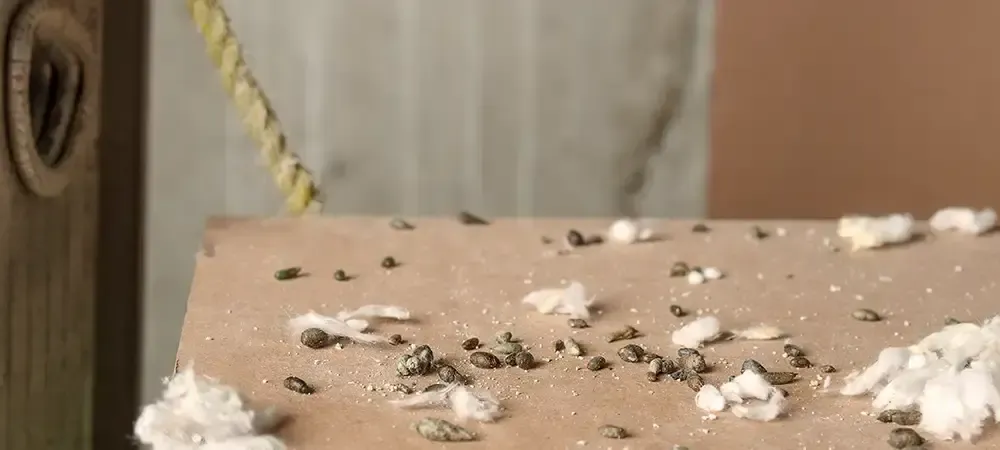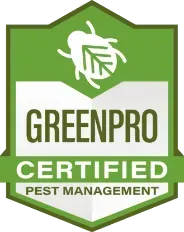Mouse Droppings vs Rat Droppings

Rodent infestations are a common household problem, and one of the telltale signs is the presence of droppings. While mice and rats may seem similar, their droppings exhibit distinct characteristics that can help homeowners identify the culprit behind the unwelcome visitors. In this blog, we'll delve into the details of mouse vs. rat droppings, discussing their appearance, size, and potential health risks. Additionally, we'll explore effective methods for managing rodent infestations.
Identifying Mouse vs Rat Droppings
Are you worried that you might be sharing your home with a mouse infestation or a colony of rats? Learn how to tell apart rat poop vs mouse poop.
How To Identify Mouse Poop
Mouse droppings are generally smaller than those of rats, measuring about 1/8 to 1/4 inch in length. They are cylindrical with pointed ends and have a smooth texture, resembling a grain of rice. The color of mouse droppings varies depending on their age, ranging from dark brown to black. Fresh droppings tend to be darker, while older ones may appear lighter.
How To Identify Rat Poop
Rat droppings are larger compared to mouse droppings, measuring around 1/2 to 3/4 inch in length. They are also cylindrical but have blunt ends. The texture is rougher than that of mouse droppings, often with visible graininess. The color of rat droppings is usually dark brown to black, resembling a more uniform shade.
Are Rodent Droppings Dangerous?
Yes, rodent droppings can pose health risks as they may contain various pathogens, bacteria, viruses, and parasites that can be harmful to humans. One notable concern associated with rodent droppings is the potential transmission of the hantavirus. The hantavirus is a group of viruses that can be found in the urine, saliva, and droppings of infected rodents, such as mice and rats.
What To Do If You Find Rodent Droppings
Discovering rodent droppings in your house can be unsettling, but it's essential to proceed with caution to help to minimize potential health risks! We recommend calling a certified local rodent exterminator right away.
Once you have confirmed that it is safe for you to do so, carefully start cleaning up the feces by following our step-by-step guide:
1. Gather the Necessary Supplies
Before you begin the cleanup, gather the following supplies:
- Disposable gloves
- Mask or respirator
- Disposable coveralls (optional)
- Plastic bags
- Paper towels or disposable cloths
- Disinfectant solution (bleach and water mix)
- Spray bottle
- Sealable plastic container for disposal
2. Put on Protective Gear
To protect yourself from direct contact and inhalation of airborne particles, put on disposable gloves and a mask or respirator. If available, consider using disposable coveralls for added protection.
3. Ventilate the Area
Open windows and doors to ensure proper ventilation in the space where you found the droppings. Increased airflow will help reduce the concentration of airborne particles.
4. Dampen the Droppings
Using a spray bottle, mist the droppings with a disinfectant solution or a mixture of water and bleach. Dampening the droppings helps minimize the risk of releasing airborne particles during the cleanup process.
5. Clean Up the Droppings
Use disposable materials such as paper towels or disposable cloths to carefully pick up the droppings. Avoid sweeping or vacuuming, as these actions can create dust and increase the risk of inhalation.
6. Double-Bagging
Place the droppings and the cleaning materials in a plastic bag. Seal the bag securely to prevent any potential leakage. For an extra layer of protection, place the sealed bag into another plastic bag. Dispose of the double-bagged waste in an outdoor garbage can.
7. Dispose of Waste Properly
Dispose of the sealed plastic bag containing droppings and cleaning materials in an outdoor garbage bin. Ensure that the garbage bin has a secure lid to prevent further attraction of rodents.
8. Disinfect the Area
Clean the entire affected area using a disinfectant solution. Pay attention to surfaces that may have come into contact with the droppings, such as countertops or floors. Wipe down surfaces thoroughly and allow them to air dry.
9. Remove Protective Gear
Carefully remove your protective gear, starting with the gloves. Avoid touching the exterior of the gear to prevent contamination. Dispose of the gloves and any disposable coveralls in the same manner as the double-bagged waste.
10. Wash Your Hands Thoroughly
After removing the protective gear, wash your hands thoroughly with soap and water. This is a crucial step to ensure you don't inadvertently transfer any contaminants.
11. Take Proactive Measures
Remove potential food sources, such as open food containers and crumbs. Store food in airtight containers, and keep pet food in sealed containers. You should also regularly clean and declutter your living space to eliminate hiding spots for rodents.
12. Schedule a Comprehensive Rodent Inspection
If you are finding rodent feces, it indicates that you are probably providing shelter to unwanted guests. Within a matter of weeks, this can easily turn into a full rat infestation. So if you haven't done so already, call your local rodent exterminators to schedule a detailed consultation. Professionals can help you assess the situation, implement effective control measures, and provide advice on preventing future infestations.
Remember that rodent droppings can carry harmful pathogens, so it's crucial to approach the cleanup process with caution and thoroughness. Taking these steps promptly can help ensure a safer and healthier living environment for you and your family.
Call Professional Rodent Exterminators
Cleaning up rodent droppings requires a cautious and systematic approach to protect against potential health risks. By following these steps and taking preventive measures, you can ensure a safe and healthy living environment for you and your family. If you have concerns about the extent of the infestation, reach out to a professional pest control company for thorough eradication and preventive measures.
For those living in Southwestern Utah, look no further than Western Pest Control. Our team of local rodent exterminators can help you identify and treat for a variety of species of rats and mice. Contact our team today to learn more!


